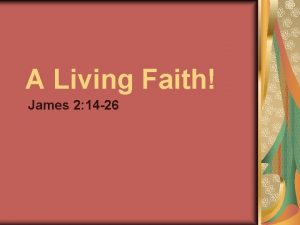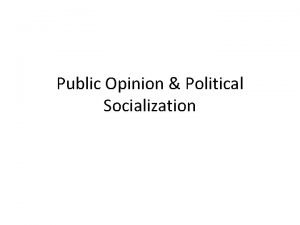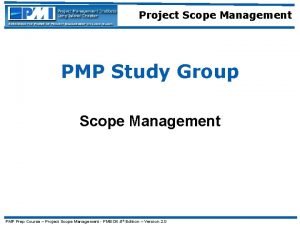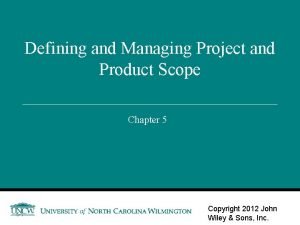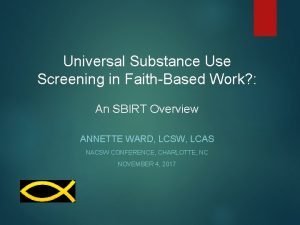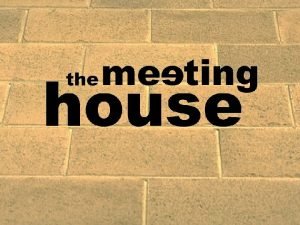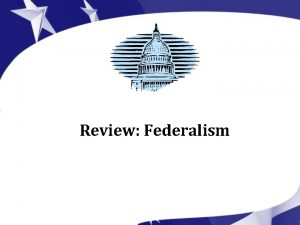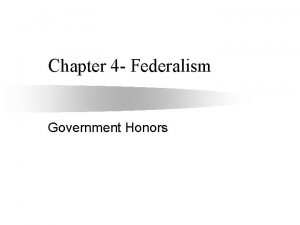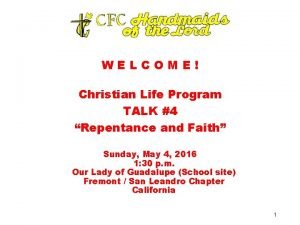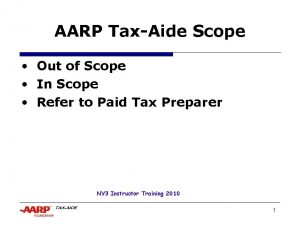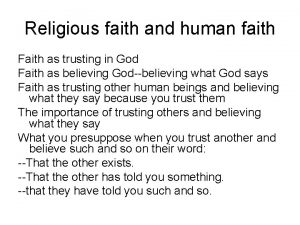MATTERS OF FAITH AND MATTERS OF OPINION SCOPE
















- Slides: 16

MATTERS OF FAITH AND MATTERS OF OPINION

SCOPE OF THE STUDIES • Explaining matters of faith and matters of opinion • How to identify matters of faith from matters of opinion • Biblical instances of matters of faith and matters of opinion • How to deal with matters of faith and matters of opinion

INTRODUCTION • Christ foresaw that there was bound to be division in the future Church arising from diversity in appreciation of the Word of God and the influence of Satan. Consequently He prayed against the menace of division. According to Christ, Unity was essential for the growth of His followers and also an essential element in identifying them as followers of Christ. John 17: 20 -23

INTRODUCTION • Also, the Apostle Paul cautioned the early Christians against charting the path of division. Instead, he admonished them to pursue the cause of unity. 1 Cor 1: 10 • See also Phil 2: 2 • Now, let’s come to the substantive subject:

MATTERS OF FAITH AND MATTERS OF OPINION • For a better appreciation of this topic, it is important that we situate it in our context. By situating it in our context, I mean to say that we should, for instance, situate it in the context of matters relating to COC, Legon. Let’s bring our mind to a popular statement in Christendom that seeks to resolve the problems arising out of the subject of “Matters of Faith as against Matters of Opinion” :

MATTERS OF FAITH AND MATTERS OF OPINION • “In matters of faith, unity; in matters of opinion, liberty; in all things, love. ” It was coined by a German Lutheran writer named Peter Meiderlin (or Rupertus Meldenius) • As part of our studies, we will also have a read of Roman 14 to aid our appreciation of this subject. However, this will be done next week. This should cater for how we could resolve the difficulty.

“MATTERS OF FAITH” • a. “Faith” is generally used in two senses: • (1) Subjective faith (the fides quae, or “faith by which” one believes). This is the ACT of believing. • (2) Objective faith (the fides qua, or “the faith which” is believed). This is the CONTENT of what we believe to be true. It is the doctrine to which our minds give assent.

MATTERS OF FAITH • b. In the expression “matters of faith, ” the word “faith” is used in the latter sense. It refers to what we as Christians are called upon to believe. • c. These are teachings which all Christians ought to believe. 1 Corinthians 1: 10, “Now I exhort you, brethren, by the name of our Lord Jesus Christ, that you all agree … I. e. , we have a moral obligation to have “the same mind” and “the same judgment” in matters of faith.

MATTERS OF FAITH • d. This exhortation to unity implies that there is only one true belief, one true interpretation, for such matters of faith. • If we truly believe the Bible is the WORD of GOD, then we must also believe the following: • (1) That every statement in Scripture, and every communication therein of any kind, has one correct meaning, that God intends it to be understood in one specific way—no matter what the subject is, whether related to salvation or not.

MATTERS OF FAITH • (2) That human beings made in God’s image are ABLE to discern what this one correct understanding is, by applying the normal principles of language exegesis. • (3) That we are morally bound and obligated to seek, believe, and teach this one true understanding of God’s Word. This includes the idea that we are morally obligated to agree or be of the same mind on God’s words to us.

MATTERS OF FAITH • -- Philippians 2: 2 – “Make my joy complete by being of the same mind [phroneô], maintaining the same love, united in spirit [phroneô], intent on one purpose. ” Here we are exhorted to “think the same thing, ” and to “think the one thing. ” • “The fundamental demand of this exhortation is a uniform direction, a common mind, and unity of thought and will” (Kittel, TDNT, 9: 233). Philippians 4: 2 has the same exhortation.

MATTERS OF OPINION • “In matters of opinion, liberty. ” • 1. Cottrell discusses two types of opinions in relation to this subject: • a. FORMAL opinions : This term refers to ANY view/position/conclusion/judgment/belief which anyone holds on any subject whatsoever. Whatever we believe, for whatever reason, we can say (in this formal sense), “It is my opinion that. . ” We are simply saying, “This is my judgment, my conclusion, on the matter. ”

MATTERS OF OPINION • (2) He calls this kind of opinion a formal opinion because the content of it is beside the point, and so also is how people actually came to hold such an opinion. • Thus one may say, “In my opinion, Jesus Christ is the Son of God. ” This just means, “I have come to the conclusion that Jesus Christ is the Son of God. ” “It is my judgment that Jesus Christ is the Son of God. ” “I accept as true the idea that Jesus Christ is the Son of God. ” • To call such a judgment a formal opinion is simply to acknowledge that the human mind goes through particular ways or processes of drawing conclusions or coming to its views on anything. (3) In this sense the word “opinion” applies to everything we accept as true.

MATTERS OF OPINION • (4) Regarding opinions in this formal sense, everyone has the physical (or metaphysical) freedom/liberty to hold any such view he chooses, to draw any conclusion he desires, about any subject. This is simply what it means to have free will. But in matters where God has spoken, no one has the moral freedom or liberty to hold to aney view he chooses. • The only opinions we have the moral liberty to choose are matters on which God has not spoken. In such cases our views are opinions not only in this formal sense, but also in the material sense, as explained in the following point.

MATTERS OF OPINION • b. MATERIAL opinions. • (1) Cottrell calls these material opinions because the word “opinion” here refers not to the process of arriving at said opinion, but to its content. • (2) A material opinion is a judgment or conclusion about some material aspect of reality, but it is a judgment for which there is no objective way of determining whether it is true or false, right or wrong.

MATTERS OF OPINION • Such an opinion is a conclusion about reality based not on some factual evidence outside of us, but on some preference, some liking or disliking, within ourselves. Any statement for which there is adequate objective evidence as to its truth cannot properly be called an opinion in this material sense. Rather, it is simply a fact.
 Dead faith vs living faith
Dead faith vs living faith Private opinion becomes public opinion when
Private opinion becomes public opinion when Scope management pmp
Scope management pmp Product scope vs project scope
Product scope vs project scope Sbirt faith and spirituality
Sbirt faith and spirituality Amendment 2
Amendment 2 Faith and action quotes
Faith and action quotes Inherent powers
Inherent powers Praise the source of faith and learning lyrics
Praise the source of faith and learning lyrics Examples of federalism
Examples of federalism Nursing metaparadigm examples
Nursing metaparadigm examples On guard defending your faith with reason and precision
On guard defending your faith with reason and precision Add to your faith
Add to your faith Paperless hymnal
Paperless hymnal Repentance and faith talk 4
Repentance and faith talk 4 Faith prefix and suffix
Faith prefix and suffix God does not forget
God does not forget
